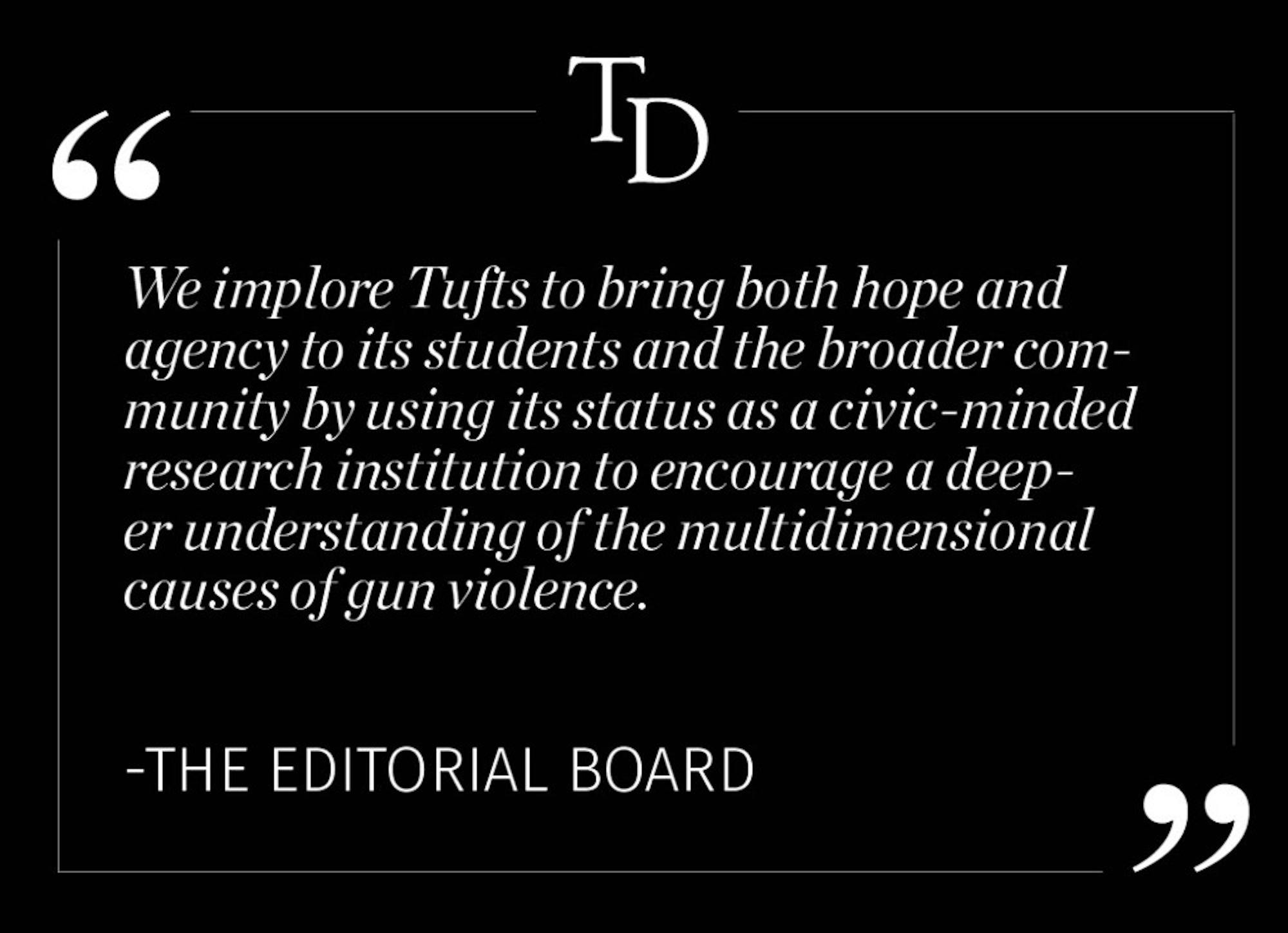Last week, in the wake of the massacre at The Covenant School in Nashville, Tenn., we wrote about the sorrow and collective trauma shared by our generation of students who have been left waiting in fear of being the next victim of a school shooting.
It is clear that only legislative change can prevent gun violence; but even though groups such as Everytown for Gun Safety and the Brady Campaign to Prevent Gun Violence call for an assault weapons ban, similar to policy changes in other advanced democracies after mass shootings, the likelihood of enacting this ban feels like a pipe dream in our current political environment.
Two factors complicate this policy solution. From a legal perspective, an assault weapons ban would likely be struck down in court as a violation of the Second Amendment. Many legal scholars who view the constitution as a living document argue that the Second Amendment does not protect the right to own an assault rifle due to its increased capacity compared to the weapons available when the amendment was drafted. However, the current U.S. Supreme Court, with its textualist and originalist leanings, does not seem to agree — particularly after Justice Clarence Thomas’ ruling in New York State Rifle & Pistol Association, Inc. v. Bruen.
Additionally, though public opinion is generally supportive of banning the sale of military-grade assault weapons, Republican opposition in the House, including from House Majority Leader Steve Scalise who was shot at a 2017 congressional baseball practice, may prove insurmountable. In fact, even some Democrats have come to realize such a ban does not have the votes to pass. Thus, policy solutions remain stalled until a compromise can be reached: a dim prospect within a political system which has time and again upheld gun rights.
But gun violence is not confined to mass shootings, nor is it only committed with assault rifles. Instead, it is a widespread danger, encompassing suicides, domestic violence, police-involved shootings and unintentional gun injuries and death. Therefore, if we’re to realistically confront the epidemic of gun violence, we must consider policy solutions beyond an assault weapons ban.
Gun violence is inseparable from the current mental health crisis. While allusions to the mental health crisis have repeatedly been touted by Republicans in the aftermath of mass shootings, it is crucial to understand the bidirectional relationship between mental illness and gun violence.
According to the American Psychological Association, mental illness is a risk factor in gun violence. A 2015 study from the National Institutes of Health found that though there is a weak link between mental illness leading to mass violence, there is a clear relationship between mental illness and suicide via firearm. Additionally, according to data maintained by the Centers for Disease Control and Prevention, the majority of gun violence deaths in 2020 were either unintentional or suicides, rather than mass shootings or homicide. These data signal another important dimention of gun violence: public health. Gun violence has tragically become a consistent leading cause of premature death in the United States — one that merits increased attention.
Finally, we must consider the psychological effects of gun violence on communities. As our editorial noted, our generation, so accustomed to school shootings, has developed a collective trauma and anxiety around gun violence. According to the American Psychological Association, mass shootings are detrimental to teenage mental health, and a demonstrated association between gun violence and increased levels of anxiety and suicide mark this as unmistakable.
Yet the psychological implications of gun violence are more pronounced outside of schools. Community gun violence leaves communities wrestling with trauma and grief — and too frequently, this causes more violence. This is particularly true in low-income communities of color.
Despite the multidimensional nature of gun violence, the issue has not received sufficient attention in academic research. Much of this can be attributed to the lack of federal funding for gun violence research.
In 1996, U.S. lawmakers stopped allocating federal funding toward gun violence research. The passage of the Dickey Amendment effectively prohibited the CDC from using federal injury prevention funds to research gun violence and gun control. After over two decades without federal financing of this key research, Congress reached a deal in 2019 to provide the CDC and NIH each with $12.5 million per year for gun violence research. Despite this hopeful renewal of resources dedicated to the cause, federally funded research on gun violence is still playing catch-up after its long hiatus.
As a civic-minded, research-driven university, Tufts should take a step toward addressing gun violence by advancing interdisciplinary research on the topic. We thus encourage Tufts to establish a Center for the Study of Gun Violence within the Jonathan M. Tisch College of Civic Life.
The center would investigate the public opinion concerning gun violence and gun ownership. In addition, the center should work to democratize information regarding the legal barriers posed by the Second Amendment which serve as roadblocks to public policy efforts to address gun violence. From a public health standpoint, the center should seek to address the root causes of gun violence — investigating the relationship between gun violence and firearm access, socialization, mental illness or predispositions of other origins.
Together with the Equity in Health, Wealth and Civic Engagement Priority Research Cluster, the center could also leverage data on experiences with and public opinion on gun violence with their annual nationally representative survey of Americans.
Tufts prides itself on being a civically engaged institution that prepares and encourages students to bring change to our communities. Gun control and reforms on gun safety laws are evidently far overdue in this country, and despite barriers to these changes in the political and legal landscape, we hope Tufts can facilitate understanding and change.
We implore Tufts to bring both hope and agency to its students and the broader community by using its status as a civic-minded research institution to encourage a deeper understanding of the multidimensional causes of gun violence.






